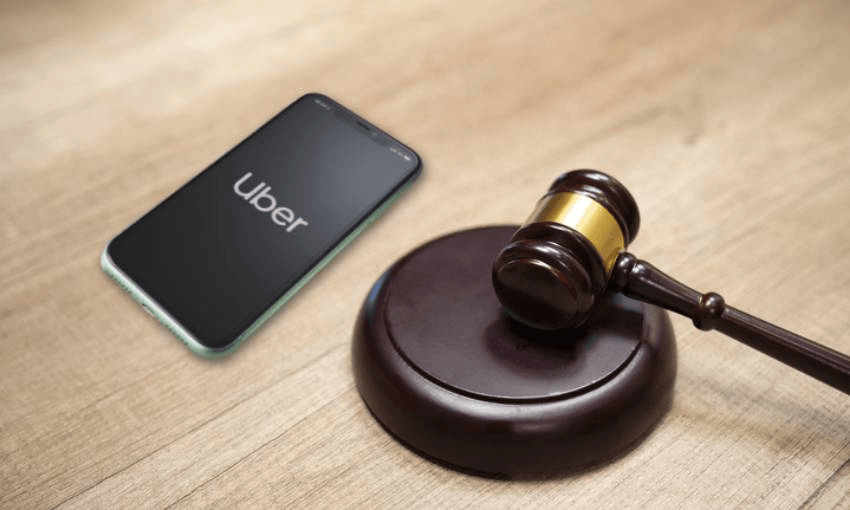The blurred lines between employees and independent contractors have once again been examined in the employment court. This time it involves the world’s largest ride-hailing company.
For the very first time, Uber has been drawn into the New Zealand Employment Court to contest whether a former driver was an employee or an independent contractor. This week’s hearing in Auckland follows a number of overseas legal cases against the giant ride-hailing corporation in which drivers have challenged the lack of security and employment rights within the industry.
The two-day hearing heard from plaintiff Atapattu Arachchige who drove for Uber from 2015 until he was dismissed in 2019. He applied to the Employment Court for a declaration that he had been an employee of Uber rather than a contractor so that he could pursue a personal grievance over what he considered was his unjustifiable dismissal. As an employee, Arachchige would also be entitled to minimum employment rights such as minimum wage and leave entitlements.
The defence representing both Uber and its New Zealand subsidiary Rasier New Zealand Ltd argued that Arachchige had been an independent contractor, or “driver-partner”, and that this was reflected in the employment contracts he had knowingly signed.
Amanda Gilmore, Uber head of driver Australia and New Zealand, gave evidence for the defence through video link from Sydney. She confirmed Arachchige was required to provide an appropriate vehicle and necessary documentation and driving credentials to become a driver but was otherwise allowed to run his own business and had the ability to make his own hours and seek work through other ride-hailing companies.
The defence said he had also paid for his own insurance, maintenance on his car and procured the services of an accountant.
However, the plaintiff’s counsel, Garry Pollak, argued that Arachchige was simply driving for Uber without any potential to grow his business or have a share in the corporation’s success, and that this work did not reflect the true definition of an independent contractor.
“There is simply nothing for the plaintiff to grow, nothing for him to sell, and all he does is drive his vehicle in compliance with Uber’s instructions,” Pollak said.
“Uber insist on calling the plaintiff a driver ‘partner’. Partnership implies a seat at the table, but the plaintiff has no negotiating ability whatsoever… The plaintiff has no input into pricing strategy, operational policies, the community guideline policies or any terms and conditions.
“There is a complete imbalance of power.”
Much of the hearing focused on Section 6 of the Employment Relations Act – the meaning of an “employee” – with both parties disputing the minutiae of Arachchige’s work with Uber to ascertain whether it constituted that of an employee.
Throughout the hearing there was also frequent comparison to the recent Leota judgement, in which a courier driver was ruled to be an employee of courier company Parcel Express rather than a contractor. In that case the judge ruled that because the driver had committed significant resources in order to undertake work exclusively for Parcel Express – despite not being fully aware of the circumstances due to language difficulties – he was not in business for himself.
“The totality of the evidence strongly suggests that Mr Leota had no business of his own; he was solely in the business of Parcel Express,” the judge ruled.
While Uber’s defence argued that Arachchige’s case was not a comparison – that he was well aware of the contractual requirements and was afforded far more autonomy and flexibility in his role as a driver – Pollak said both cases were defined by the fundamental question of who is in control of the business and who profits from its success.
“Whose business is it? It’s Uber’s,” he said.
A large part of the plaintiff’s evidence argued that Uber actively monitors its drivers’ performance, and dismisses them if they fall below a certain driver rating. Uber’s defence denied this was the case and said that Arachchige had been dismissed following a complaint lodged against him.
The plaintiff’s counsel also contested Uber’s view that a driver acts as an independent contractor because he or she enters into a commercial contract with a passenger or rider when commencing and completing a pick-up.
Pollak said it was impossible for an Uber driver to establish a commercial contract with a passenger when they have no ability to determine the rates or even the true identity of the passenger through the driver app.
“Everything he does is determined by Uber,” he said. “You cannot have a commercial contract where the pricing and passengers personal details are withheld from him. There is an absence of the aspects of a bargain that creates a contract.”
With the hearing concluded, the judge will consider the evidence and deliver her ruling within the next two months.
Pollak told The Spinoff strong evidence was presented by both parties and the ruling could go either way, but if it is in Arachchige’s favour it will be the first of its kind in any common law country. While Australia, the UK, the US and Canada have had similar cases, the rulings have either been appealed by Uber or overturned by other courts and are therefore not final.
However, because the employment court is a specialist court unique to New Zealand, Uber would not be able to appeal the ruling so easily – the reason why Parcel Express did not appeal the Leota judgment.
“Our law in New Zealand is quite unique and we are much more modern than overseas jurisdictions,” Pollak said.
“The employment court isn’t the final court, but it will be the last word on it in New Zealand. It will have an effect.”



